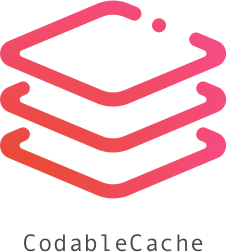CodableCache 0.2.2
| 测试已测试 | ✓ |
| 语言语言 | SwiftSwift |
| 许可 | MIT |
| 发布最新发布 | 2017年12月 |
| SwiftSwift 版本 | 4.0 |
| SPM支持 SPM | ✓ |
由 Macbook 维护。
CodableCache 0.2.2
- 作者
- Andrew Sowers
- andrewsowers
📦 📲 CodableCache
什么是 CodableCache?它是一个框架,允许对您的普通 Swift 结构体进行无缝的内存缓存和磁盘持久化。只需定义一个模型并使它符合 Codable – 您就可以使用 CodableCache 了。
📋 🧐 功能
- 简单易用的基于键和泛型类型的透明缓存
- 任何符合
Codable的内容都能自动工作 - 除了可选的自定义
Codable编码/解码器外,无需编写序列化器 - 通过可编码包装器与图像一起使用
- 易于集成到现有工作流程中
- 由经过战斗检验的 NSCache 和 NSKeyedArchiver 支持
- 包含电池 - 默认情况下,您必须自己创建工作流程和处理缓存错误
🎓 📕 一些历史
Codable Cache 是我之前的 LeanCache 框架的一个简易替代品,它通过指定符合 NSCoding 的泛型类型来进行支持。它提供了如 let x: NSNumber? = Cache 这样的工作流程,这仍然很好,但是编写 NSCoding 序列化器是个头疼的问题。因此,诞生了 CodableCache。
👩💻 👨💻 示例代码
要开始使用,只需导入 CodableCache,定义一个符合 codable 的模型,并开始编程。以下是一些使用 CodableCache 的几个示例。
创建一个由持久缓存支持的 person 管理器
import CodableCache
struct Person: Codable {
let name: String
let age: Double // kids are half ages if you recall 😜
}
final class PersonManager {
let cache: CodableCache<Person>
init(cacheKey: AnyHashable) {
cache = CodableCache<Person>(key: cacheKey)
}
func getPerson() -> Person? {
return cache.get()
}
func set(person: Person) throws {
cache.set(value: person)
}
}
然后可以像这样使用它
let personManager = PersonManager(cacheKey: "myPerson")
try? personManager.set(value: MyPerson)
if let person = personManager.get() {
print(person.age)
}自信地缓存 JSON
import CodableCache
//...
struct TestData: Codable {
let testing: [Int]
}
func saveJSON() {
let json = """
{
"testing": [
1,
2,
3
]
}
"""
guard let data = json.data(using: .utf8) else {
return
}
let decodedTestData: TestData
do {
decodedTestData = try decoder.decode(TestData.self, from: data)
try codableCache.set(value: decodedTestData)
} catch {
// do something else
return
}
}
获取用于后续使用的已缓存 JSON
import CodableCache
final class AppDelegate: UIResponder, UIApplicationDelegate, UNUserNotificationCenterDelegate {
let appSettings = CodableCache<Settings>(key: "com.myApp.settings")
func application(_ application: UIApplication, didFinishLaunchingWithOptions launchOptions: [UIApplicationLaunchOptionsKey: Any]?) -> Bool {
if let settings = appSettings.get() {
doSomethingUseful(with: settings)
}
return true
}
// ...
}
指定不同的存储目录
import CodableCache
struct Person: Codable {
let name: String
let age: Double
}
// this data will not be purged by the system like .cachesDirectory would
let persistentPersonStorage = CodableCache<Person>(key: "myPerson", directory: .applicationSupportDirectory)
创建一个泛型缓存
import CodableCache
final class GenericCache<Cacheable: Codable> {
let cache: CodableCache<Cacheable>
init(cacheKey: AnyHashable) {
self.cache = CodableCache<Cacheable>(key: cacheKey)
}
func get() -> Cacheable? {
return self.cache.get()
}
func set(value: Cacheable) throws {
try self.cache.set(value: value)
}
func clear() throws {
try self.cache.clear()
}
}然后可以像这样使用它
let myCache = GenericCache<MyType>(cacheKey: String(describing: MyType.self))👩🔬 👨🎨 理念
通常,我们可以使用像 CoreData、Realm 或 SQLite 这样的重量级工具,但这通常是过度杀伤。更常见的情况是我们只是基于一些 JSON 接口将一些本地状态进行备份 - 使用飞船在街区散步CodableCache,我们采用不同的方法,允许您快速定义模型,跳过样板和序列化器,并开始以闪电般的速度保存您的数据。
💻 🚀 安装
Cocoapods
CocoaPods 是 Cocoa 项目的依赖管理工具。您可以使用以下命令安装它
$ gem install cocoapodsCodableCache 需要 CocoaPods 1.1+ 来构建。
要使用 CocoaPods 将 CodableCache 集成到您的 Xcode 项目中,请在您的 Podfile 中指定它
use_frameworks!
target '<Your Target Name>' do
pod 'CodableCache'
end然后,运行以下命令
$ pod installCarthage
Carthage是一个去中心化的依赖管理器,它构建您的依赖项并提供二进制框架。
您可以使用以下命令使用Homebrew安装Carthage:
$ brew update
$ brew install carthage要使用Carthage将 CodableCache 集成到您的 Xcode 项目中,在您的 Cartfile 中指定它。
github "asowers1/CodableCache" "master"
运行
carthage update
在您的应用程序的目标中,在“通用”选项卡下的“链接框架和库”部分,从由carthage update生成的 Carthage/Build/iOS 目录中拖放 CodableCache-iOS.framework。
Swift 包管理器
Swift 包管理器是一个用于自动分发 Swift 代码的工具,并集成到 swift 编译器中。它处于早期开发阶段,但 Alamofire 支持其在支持平台上的使用。
一旦您设置了 Swift 包,将 CodableCache 添加为依赖项就像将它添加到您的 Package.swift 的 dependencies 值一样简单。
dependencies: [
.Package(url: "https://github.com/asowers1/CodableCache.git")
]🙋 🙋♂️ 贡献
请随意提交问题或拉取请求 – 我会很乐意提供帮助。





